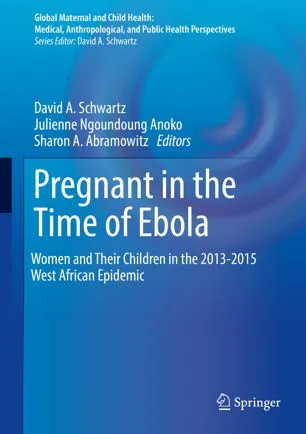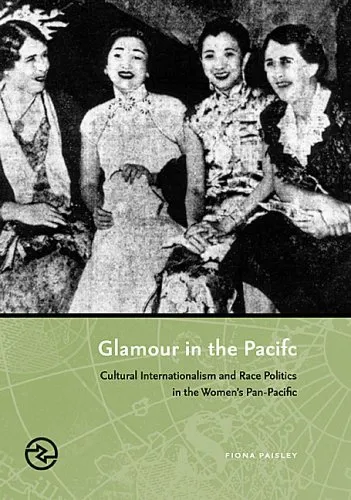Pregnant in the Time of Ebola: Women and Their Children in the 2013-2015 West African Epidemic
4.7
بر اساس نظر کاربران

شما میتونید سوالاتتون در باره کتاب رو از هوش مصنوعیش بعد از ورود بپرسید
هر دانلود یا پرسش از هوش مصنوعی 2 امتیاز لازم دارد، برای بدست آوردن امتیاز رایگان، به صفحه ی راهنمای امتیازات سر بزنید و یک سری کار ارزشمند انجام بدینکتاب های مرتبط:
مقدمهای بر کتاب "Pregnant in the Time of Ebola: Women and Their Children in the 2013-2015 West African Epidemic"
کتاب "Pregnant in the Time of Ebola: Women and Their Children in the 2013-2015 West African Epidemic" به نگارش دیوید آ. شوارتز، جولیئن آنگوندونگ آنوکو و شارون آ. آبراموویتز، یک کلیک مهم و مفصل بر شیوه تأثیر بحران Ebola بر زنان باردار و کودکان آنها در جریان اپیدمی ۲۰۱۳ تا ۲۰۱۵ در غرب آفریقا ارائه میدهد. این کتاب به بررسی مسائل پیچیده و بحرانی میپردازد که زنانی که در دوران بارداری درگیر این بحران بودهاند، با آن مواجه شدهاند. در کنار پرداختن به چالشها، راهبردها و راهحلهای مختلفی که در این زمان به کار گرفته شدهاند نیز مورد مطالعه قرار میگیرد.
خلاصهای از کتاب
داستان این کتاب در قلب بحران Ebola جایی میگیرد و به بررسی جزئیات نحوه تعامل سیستمها و جوامع با زنان و مادران باردار در زمان اپیدمی میپردازد. نویسندگان این کتاب با نگاهی نظاممند به تحلیل دادههای بهداشتی، شماری از مصاحبهها و داستانهای واقعی، تجربه زنان باردار و تأثیر بحران بر سلامت روانی و جسمی آنها را مستند کردهاند. این مطالعات همزمان به بررسی تأثیرات اجتماعی و فرهنگی این بحران بر دسترسی به خدمات بهداشتی و حمایتی زنان میپردازند.
نکات کلیدی
- بررسی تأثیر بحران Ebola بر دسترسی زنان به خدمات بهداشتی و درمانی و تاثیر آن بر سلامت مادر و کودک.
- مشکلات اجتماعی و فرهنگی که در زمان اپیدمی باعث محدودیت و چالش در ارائه مراقبتهای بهداشتی به زنان باردار شدهاند.
- تجزیه و تحلیل سیاستها و پاسخهای دولتی و غیر دولتی به بحران و تأثیر آن بر زنان باردار.
- تجارب روایتی زنان و خانوادههای آنها در مقابله با تاثیرات روانی و اجتماعی بحران.
نقلقولهای معروف از کتاب
"In the time of Ebola, every pregnancy was shadowed by uncertainty and fear, yet it was marked with courage and resilience."
"The invisible boundaries of gender and culture became starkly visible when the threat of Ebola loomed above."
چرا این کتاب مهم است؟
این کتاب به بررسی موضوعی میپردازد که اغلب در بحرانهای بهداشتی به حاشیه رانده میشود: تأثیر بحران بر زنان باردار و کودکان. پرداختن به این موضوع از زاویههای مختلف – پزشکی، اجتماعی، فرهنگی و سیاسی – باعث میشود تا درک جامعی از چالشها و نیازهای این گروه حساس اجتماعی بدست آید. این کتاب به نوعی نه تنها به ثبت تاریخچه یک بحران میپردازد، بلکه به ارائه درسها و راهکارهای حیاتی برای مدیریت بهتر بحرانهای آینده و حمایت از زنان و کودکان میپردازد. از این رو، این کتاب به عنوان ابزاری ارزشمند برای محققان، سیاستگذاران و هر کسی که به دنبال درک عمیقتر از تأثیرات چندوجهی بحرانهای بهداشتی بر جوامع است، حائز اهمیت است.
Introduction to 'Pregnant in the Time of Ebola: Women and Their Children in the 2013-2015 West African Epidemic'
The book 'Pregnant in the Time of Ebola: Women and Their Children in the 2013-2015 West African Epidemic' delves deeply into the intersections of global health crises, gender dynamics, and vulnerable groups' experiences during one of the deadliest viral epidemics in recent history. Authored by David A. Schwartz, Julienne Ngoundoung Anoko, and Sharon A. Abramowitz, this comprehensive work captures the multifaceted challenges faced by pregnant women and their children amidst the catastrophic Ebola outbreak in West Africa. This epidemic not only threatened the survival of millions but also exposed severe systemic vulnerabilities, particularly concerning women's health and societal roles.
Detailed Summary of the Book
The book presents an exhaustive exploration of the 2013-2015 Ebola epidemic, with a keen focus on pregnant women and their children in affected regions. Through meticulously researched chapters, it uncovers the layered tragedy of disruption in healthcare services, cultural misconceptions, and gender-based disparities that compounded the risks for expectant mothers. The authors weave narratives from numerous firsthand accounts, epidemiological data, and health policy analyses to present a holistic picture of the epidemic's impact.
Each chapter examines specific themes such as the breakdown of maternal healthcare, stigmatization of pregnant women, and the tragic bi-directional threat of Ebola transmission between mother and child. The book sheds light on the systemic inequities that led to poorer outcomes for expectant mothers and their newborns, juxtaposing these realities against the backdrop of an international health response that often overlooked these critical intersections.
Key Takeaways
- The Ebola epidemic starkly highlighted the vulnerabilities of healthcare systems in crisis zones, especially concerning maternal health services.
- Pregnant women were disproportionately affected due to both biological and socio-cultural factors, resulting in a dire need for targeted interventions.
- The book underscores the importance of culturally sensitive approaches in international health responses to better support vulnerable groups.
- Effective communication is essential in dispelling myths and managing fears surrounding infectious diseases, which can exacerbate during crises.
- Global health governance requires a lens that explicitly addresses gender disparities to mitigate the impacts of future epidemics.
Famous Quotes from the Book
"In the time of Ebola, a pregnant woman was not just a patient; she became a symbol of the systemic failures in addressing gender-specific needs in crisis response."
"The stories of these women weave a narrative of resilience and underscore the urgent necessity for reform in global health policies."
Why This Book Matters
'Pregnant in the Time of Ebola' is an essential contribution to the field of global health literature, offering critical insights into the vulnerabilities and resilience of marginalized populations. This book matters because it brings to the forefront the often-overlooked narratives of pregnant women and their children during health emergencies, challenging readers to reconsider how global health crises are approached and managed. It serves as a call to action for policymakers, healthcare providers, and international organizations to integrate gender-sensitive strategies in epidemic preparedness and response frameworks.
By highlighting the lived experiences of women during the Ebola crisis, the authors emphasize the importance of inclusive and equitable healthcare systems capable of responding to the needs of all individuals, regardless of gender or reproductive status. This book is not just an account of past failures but a blueprint for future resilience, advocating for systemic changes that could save lives in future outbreaks.
دانلود رایگان مستقیم
شما میتونید سوالاتتون در باره کتاب رو از هوش مصنوعیش بعد از ورود بپرسید
دسترسی به کتابها از طریق پلتفرمهای قانونی و کتابخانههای عمومی نه تنها از حقوق نویسندگان و ناشران حمایت میکند، بلکه به پایداری فرهنگ کتابخوانی نیز کمک میرساند. پیش از دانلود، لحظهای به بررسی این گزینهها فکر کنید.
این کتاب رو در پلتفرم های دیگه ببینید
WorldCat به شما کمک میکنه تا کتاب ها رو در کتابخانه های سراسر دنیا پیدا کنید
امتیازها، نظرات تخصصی و صحبت ها درباره کتاب را در Goodreads ببینید
کتابهای کمیاب یا دست دوم را در AbeBooks پیدا کنید و بخرید
1241
بازدید4.7
امتیاز0
نظر98%
رضایتنظرات:
4.7
بر اساس 0 نظر کاربران
Questions & Answers
Ask questions about this book or help others by answering
No questions yet. Be the first to ask!















